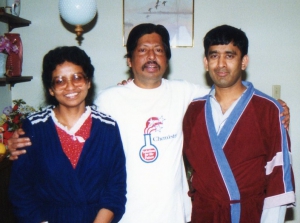The legendary singer of patriotic songs during the liberation struggle of Bangladesh in 1971, Muhammed Abdul Jabbar, has died in a hospital in Dhaka this morning (August 30), Bangladesh time. He has left behind millions of fans who were immensely inspired by his songs during the movement for fairness for the province of East Bengal within Pakistan before March 25, 1971, during the fight for independence from March to December 1971 and after the independence of Bangladesh on December 16, 1971. He will be greatly missed by millions of admirers, including this writer.
His singing of the songs "Joy Bangla Banglar Joy (Victory for Bangla, Bangla's Victory)", "Salam Salam, Hajar Salam, Sakal Shaheed Smarane (Salute Salute, a Thousand Salute in the Memory of All the Martyrs)" and "Tumi Ki Dekhechho Kovu Jiboner Porajoy (Have You Seen Defeat in Life)" in 1971 will forever remain in the memory of all patriotic Bangladeshis that lived during that time of suffering and glory. These are the kind of songs that kept the morals of the Banglaee freedom fighters and population high at that time. Thus, he was indeed a great freedom fighter for Bangladesh. His contributions to the Bangalee aspirations for fairness and freedom have been recognized by Bangladesh through the highest civilian awards of the country, the Swadhinata Padak and the Ekushey Padak.
It was an honor and a privilege for me and my wife to be able to host him in December 1991 at our apartment in Everett, a suburb of Boston, Massachusetts, USA. At that time I was a lecturer at Northeastern University and one of the two vice-presidents of Bangladesh Association of New England (BANE).
Photo: Muhammed Abdul Jabbar with the Anjali and Sukhamaya Bain couple at their home in Boston, 1991
At a personal level, I remember two things from his stay with us in Boston.
Somehow my first name is difficult for a lot of people to pronounce the way it was originally intended. One problem is its spelling. If I were to correct it to fit the Bangla pronunciation, I would have spelled it Shukhomoy. For that reason, I did not really mind when even my friends called me by my last name (Bain), as opposed to the first (Sukhamaya). Now, when Jabbar Bhai (Brother Jabbar - my wife and I called him that fondly) was at our home, he told me that my first name was a bit too long, and asked if I had a nickname. I told him that some of my close family and friends used to call me Moy mostly in my childhood. So, Jabbar Bhai was the only person outside of my close family and friend circle that ever called me Moy.
The second thing that I remember was that he scolded the Bangladeshi Islamic fanatics of the greater Boston area in the 1991 celebration of the Victory Day (December 16) by BANE at the MIT auditorium. He was an invited and honored singer at that celebration.
To make the story short, in October of that year BANE celebrated Bijoya Reunion, the post- Durga Puja celebration that is the most distinguished Bangalee Hindu religious activity. However, the program was essentially boycotted by the Bangladeshi Muslim community, as that community had too many Islamic fanatics. The fanatics not only boycotting the program, they published in the subsequent newsletter of the Bangladesh Islamic Association of New England (BISNE) 'words of wisdom' from their holy books, telling people not to mix and make friends with non-believers or with people who look at God in multiple forms.
My wife, Anjali Bain, actually trained for freedom fight in 1971; and she was more emotional than me about bringing the Islamic fanatics to task. She decided to read those 'words of wisdom' in the Victory Day program. As she spoke about the fanatics spreading of hatred within the Bangladeshi community, many in the audience shouted "shame, shame" to those 'words of wisdom'. Muhammed Abdul Jabbar was on the podium at that time; and as he felt the pain in her mind, the fighter in him for a Bangladesh for all its people got quite a bit angry. He expressed his surprise that even after coming and staying abroad, people had so narrow minds. He told the fanatics that they had caused pain in the mind of his sister, and admonished them by saying that they should be ashamed of themselves in spite of their academic accomplishments and establishments in the USA.
The great soul named Muhammed Abdul Jabbar has died at the age of about 80 years. I feel fortunate and humble that I was able to interact with him at a personal level for about two days. Lal Salam (Red Salute), Jabbar Bhai!
